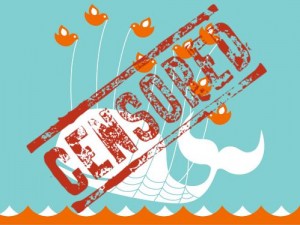
Fredrick Douglass once likened people who claimed to support freedom — but who discouraged agitation — to people who want to grow crops without plowing up the ground. 140 characters or not, it seems like an appropriate response to the news that Twitter has developed the ability to censor tweets on a country-by-country basis.
I know this isn’t a simple issue. Many countries, wary of the potentially destabilizing force of social media, simply will not allow companies like Twitter to operate unless they agree to some form of censorship. Even Google, who two years ago pulled access to their main search engine in a dispute with Chinese authorities, recently began softening its rhetoric in an attempt to regain lost time and market share.
One could make the case that a policy of engaging with oppressive regimes helps them become more liberal — even if only in small, slow increments. Change takes time and maybe half a loaf of Twitter is better than none at all.
But whether you think that idea makes sense or not, this much is clear: Many companies who market their products as tools to empower individuals are, in fact, actually building them in ways which aid in subjugating those same people.
It’s no secret that digitally propping-up dictators is big business for many large technology companies. And often times it seems to me as if some of the same people who protest attempts at draconian abuses of internet freedom in their own backyard are too ready to accept that those same abuses are going on elsewhere with a shrug. In many parts of the world, the SOPA “blackout” of the internet is an everyday reality. Most people aren’t surprised to learn that this is going on, nor are they shocked to learn that the factories who make many of our favorite products subject their workers to appalling conditions.
I can sort of understand the ambivalence: It is difficult to get your brain around the deep, difficult legacies that cultural and economic colonialism have left in poor countries. Even issues like Child Labor, something that most people would consider abuse, prima facie, is more complicated when you examine it closely. It’s hard to make any sort of sweeping, global value judgements when you look at the horrible choices that countries and people who are digging themselves out of entrenched poverty — sometimes literally — have to make.
A TALE OF TWO TWITTERS
Perhaps that’s why it’s hard for me to take Twitter’s explanation for this recent shift seriously. What can you say about a company which, on the one hand, says that it wants to be a force for good while, at the same time, embarks upon a path which trades a decrease in freedom for an increase in profits. Then compare this to the actual, genuine good that Twitter has accomplished since it started and it’s hard to not suspect some sort of corporate schizophrenic crack-up is underway.
I was in Tunisia just a few months before their revolution began and it’s hard to describe the feeling of restlessness that was in the air. Giant posters of Zine el Abidine Ben Ali were everywhere in Tunis, the grim expressions on many people’s faces seeming almost surreal when set against that near-ubiquitous backdrop of Ben Ali’s beatific gaze.1 Thanks to social media, one man’s protest — and all that restlessness — spread throughout the country. Within a month, all of those posters were being torn down by cheering crowds of Tunisians.
And a year ago this week, the people of Egypt used Twitter, Facebook, and text messages to facilitate their own popular uprising. At this moment, in places like Syria, people are shooting video footage of government troops attacking civilians on their cellphones and sharing it on Twitter, all while news people and “official monitors” find themselves unable to get a clear picture of what’s going on.
THE REAL PRODUCT
Now I’m not saying that Social Media is responsible for the change that occurred. It was the Tunisians and the Egyptians who freed themselves, not Facebook. But we also cannot discount the importance of technologies which let people connect with one another or give them real news when the traditional channels have been blocked or intimidated into silence.
People around the world aren’t clamoring for Twitter, per se. I mean, it doesn’t really matter which flavor-of-the-month social media platform we use to share videos of a dog who can say “I Love You”, does it?2
What people actually want is to be able to connect with other people quickly, globally, and without any filters. Twitter is the platform, but freedom of expression is the real product.
Aren’t we doing ourselves a disservice by diluting it for a quick buck?
Having an connected world where ideas are exchanged freely, without fear or censorship, is both a powerful driver for change — and the ultimate goal of that turn towards modernity. Twitter could be an example of what is possible in societies who tolerate the free expression of their people.
There is a long-term horizon you can look at when you’re growing a business, a culture, or a society. Maybe Twitter would be better off taking a short-term loss of market share in exchange for a longer-term gain of having the product that people actually want — and that they will use as their respective countries open up?
I started this with Frederick Douglass and I think I’ll end with him:
“Find out just what a people will submit to”, he said, “and you have found out the exact amount of injustice and wrong which will be imposed upon them.”
Finding out that others feel as we feel, that we aren’t alone in our perception of an injustice, gives us the courage to stand up for ourselves, collectively and individually. That idea has transformed the Middle East this year in ways that are still unfolding, and it has the power to do the same thing elsewhere.
And so I think it’s important to ask — Are we really okay with Twitter helping to take that power away from people, just when they need it most?
